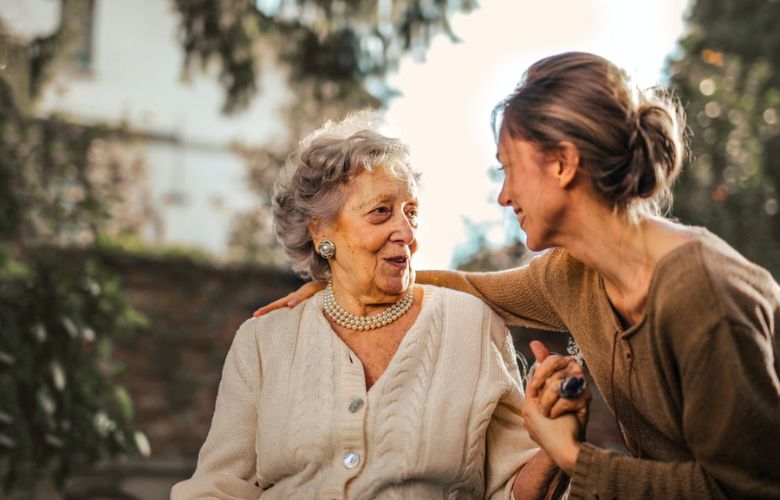The decision to care for your elderly parents at home is a big one, and it’s not just about them. You have to consider the impact this choice will have on your own life, as well as on the lives of other family members. It’s important to remember that you’re not alone in this decision. There are plenty of others who are doing what you’re doing, and they can provide support and advice as needed. If you’re looking after an elderly parent, it can be stressful and overwhelming. You should know that you’re not alone, though! Many other people are in the same boat and they want to help. Here are some steps to take when caring for your elderly parent at home:
Ensure That You’re Financially Stable
 Make sure you have enough money to support yourself and your parent. Set up a budget that makes sure your income is enough to pay for the cost of care, as well as any other expenses associated with caring for an elderly parent at home. It’s important to set aside some money each month in case of emergencies or other unexpected costs. If necessary, ask family members and friends for help with household chores and transportation so that you can focus on taking care of your mom or dad full-time.
Make sure you have enough money to support yourself and your parent. Set up a budget that makes sure your income is enough to pay for the cost of care, as well as any other expenses associated with caring for an elderly parent at home. It’s important to set aside some money each month in case of emergencies or other unexpected costs. If necessary, ask family members and friends for help with household chores and transportation so that you can focus on taking care of your mom or dad full-time.
Saving up money for an unforeseen emergency, such as a medical issue or car breakdown, is a good idea for anyone. But it’s especially important when caring for elderly parents at home. You never know when your parent might have to be hospitalized, or if they’ll need to stay with you while their doctor works to diagnose and treat their condition. It’s also possible that you’ll need to take them in for routine checkups or medical procedures, like mammograms and colonoscopies.
You may not have considered all the costs associated with caring for an elderly parent who lives with you and those costs can add up quickly. Even if your parent pays rent or bills to help cover expenses, there are still many additional expenses that come with being a primary caregiver. For example:
- Transportation costs (gasoline and maintenance)
- Food and clothing expenses (if they can’t prepare meals on their own)
- Medical bills (if they need any non-routine care)
- Household items (cleaning supplies, toiletries, etc.)
- Entertainment & leisure activities (movies/events/trips out of town)
- Utilities & other household services (gas/electricity/water bill payments)
If finances are still an issue after doing these things, talk to her doctor; she may be able to recommend some affordable options like respite care services that would allow you time away from the house while still ensuring his safety when he is alone there (and give himself a break from having someone constantly around him).
Create a Support Network
 Create a support network. It is important to create a support network for yourself, your family and your elderly parents. When caring for elderly parents at home, it is difficult to take care of yourself and your family. However, it is crucial that you do not neglect yourself or your family during this time. Take the time to make sure that you are eating healthy food and exercising regularly. You will also want to make sure that you have enough sleep so that you can function at work and at home.
Create a support network. It is important to create a support network for yourself, your family and your elderly parents. When caring for elderly parents at home, it is difficult to take care of yourself and your family. However, it is crucial that you do not neglect yourself or your family during this time. Take the time to make sure that you are eating healthy food and exercising regularly. You will also want to make sure that you have enough sleep so that you can function at work and at home.
Talk to friends and family. Share your concerns with the people you trust, even if they don’t have any experience caring for elderly parents at home. They can offer emotional support and help you identify resources that might be useful in your situation.Find a support group. Many online forums discuss everything from how best to bathe an older parent to what kind of food tastes good when a person has trouble chewing or swallowing. These sites can also connect you with other caregivers who may be going through similar experiences as yourself; these connections can provide valuable advice and companionship during difficult times.You may also be considering hiring a consultancy service in aged care to help you with the process. This can be a good idea if your parents need more intensive care than you can provide, but it’s important to know what kind of services they offer and how much they cost.
If they don’t have much money at all, then they may want you to take over their finances completely and manage them on their behalf. This isn’t always feasible because it means that you’ll need access to their accounts and credit cards in order to pay bills, buy groceries or anything else necessary for day-to-day life. If this is something that works for both parties then great! But if not then maybe consider looking into other options like helping them set up direct deposit accounts where bills are automatically paid each month without any intervention.
Talk to Your Parent’s Doctors Frequently
 Your parent’s doctor is the best resource for information about their health and care. You should contact their doctor if you have any questions about your parent’s health.
Your parent’s doctor is the best resource for information about their health and care. You should contact their doctor if you have any questions about your parent’s health.
There is a lot to think about when caring for elderly parents at home. One of the most important things to keep in mind is communication with their doctors and other medical professionals. Talk to your parent’s doctors frequently, both on a personal level and through regular phone calls or emails. The more you know about your parent’s health situation, the better prepared you will be to handle any challenges that come up. Ask for advice on how to help your parent with specific tasks such as bathing or cleaning their room; ask for help with transportation issues (if it becomes necessary); ask for help with finances; if applicable, ask about how best to communicate with your parent who has dementia or Alzheimer’s disease (for instance, does he/she understand written instructions?).
Discussing your parent’s health with their doctor is a good way to find out what challenges they may be facing and how you can help them overcome them. Your parent might have questions about their health as well. It’s important that you understand what they are asking so that you can provide them with the answers they need.
Your parent’s physician may also be able to recommend specialized services or equipment that will make caring for them easier. They may also be able to tell you how best to communicate with your parents so that they understand what is going on around them, which will allow them to feel more secure in their surroundings.
Care For Yourself
 There are several things you must take care of yourself. Your health is important, so make sure you have time for exercise and sleep. Make sure your own needs are met before caring for others. If you’re caring for an aging parent, one of the most important things you can do is take care of yourself. This can be difficult to do when you’re busy with all the responsibilities of caring for an elderly person.
There are several things you must take care of yourself. Your health is important, so make sure you have time for exercise and sleep. Make sure your own needs are met before caring for others. If you’re caring for an aging parent, one of the most important things you can do is take care of yourself. This can be difficult to do when you’re busy with all the responsibilities of caring for an elderly person.
The first thing to consider is how much time you can realistically put towards taking care of your parent. If they need a lot of help, consider hiring some outside help to assist with task such as cleaning or cooking. This will allow more time for you to spend with your parent and make sure that he or she is getting the attention they need.
You should also try to find some time each day where you can relax and decompress from all the stress that caring for an aging loved one may bring on. This could be as simple as taking a walk around the neighborhood while listening to your favorite music or watching a favorite TV show. It’s important not only for your physical health but also for your mental well-being so that you don’t burn out during this time when others are relying on you so heavily.
Don’t neglect yourself by saying yes to every request to be a good daughter or son. Instead, say no sometimes, and don’t feel guilty about it; it will help keep you sane! You can ask for help from friends or family members who live nearby or far away and even hire outside help if necessary (though this isn’t always viable). And don’t be afraid to ask for time off every once in a while you deserve it.
⇒ 5 Benefits Of At-Home Health Testing Kits (2023) Click Now
Now that you know what to do, you can be a more effective caregiver
As a caregiver, you are expected to know what to do. And if you have read this article, then you now know what to do. Now that your parent is on the way to being well taken care of, there should be less stress for them and you as their caregiver.
You can make a difference in their lives by helping them as best as possible. You will also feel good about yourself when they are happy with the results of your efforts as their caregiver.
Caring for elderly parents at home might seem overwhelming at times. Still, it doesn’t have to be if proper steps are followed and an understanding of the importance of taking care of those around us especially our loved ones who need assistance with everyday tasks like dressing themselves up or walking around the house without falling over something unfamiliar on their way downstairs which could lead into serious injuries such as broken bones or concussions which may cause death if not treated immediately after falling stairs so having someone else around would help prevent this from happening again in future days ahead whenever they move out by themselves without any assistance from anyone else.
Conclusion
These are just a few things to consider when caring for your elderly parents at home. We hope that this article has helped you to understand the emotional and financial challenges of caring for an aging parent, as well as some things that you can do to make it easier on yourself.


